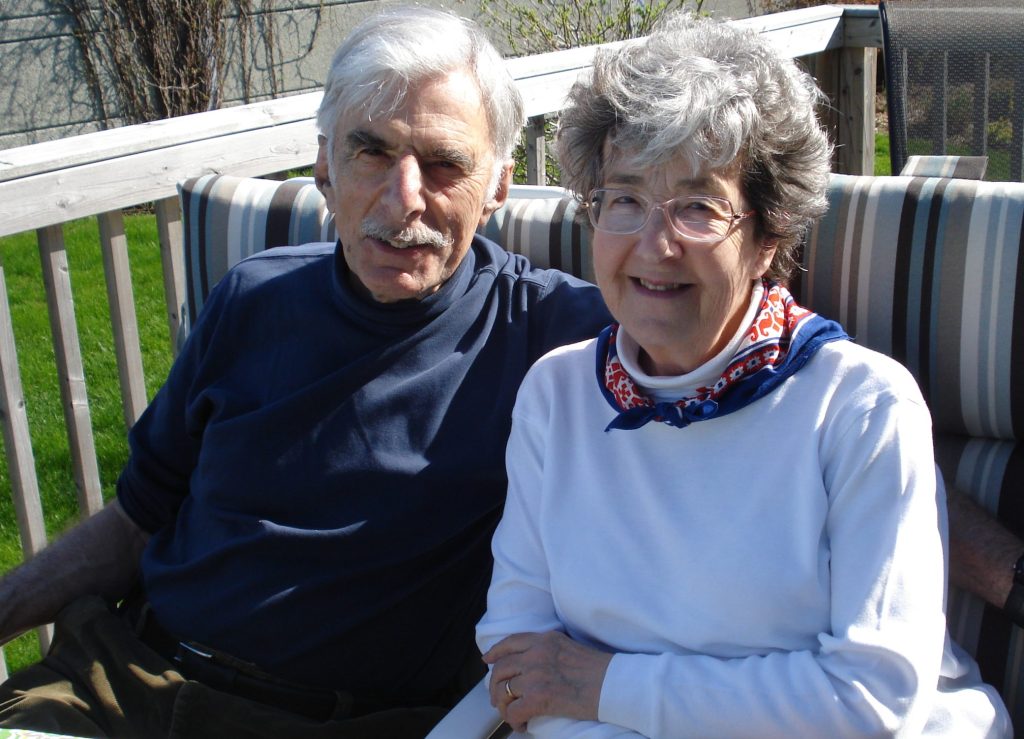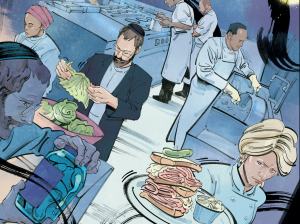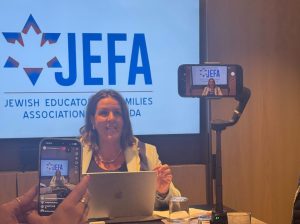Her experience of being a hidden child survivor helped Elly Dwinger Bollegraaf relay emotional details to many young Ottawans who may not have been as aware of the horrors of the Holocaust.
A dedicated volunteer within the Jewish community, she died in the nation’s capital on Feb. 16, at age 84.
“Elly was a source of information for anyone who needed information or who needed to know something about somebody in Ottawa who was a survivor. Going back 30 years, she kept records meticulously and everyone relied on her,” Mina Cohn, chair of the Centre for Holocaust Education and Scholarship (CHES) in Ottawa, told The CJN.
Born in Amsterdam in 1940, she spent her first two years living with her Aunt Johanna, her husband and two sons while her mother, Henriette Dwinger, struggled to support her young daughter working as a nurse. Her mother’s family frowned upon the idea of a marriage to Elly’s father during the Nazi occupation—because he was 11 years her senior.
“My mother hid her pregnancy,” Bollegraaf said in her testimony to CHES. “After I was born she told her family and I was very well accepted, doted upon and loved.”
One day her mother arrived at her aunt’s home to visit her daughter and a clergyman was leaving the downstairs apartment of an ill neighbour. The clergyman discovered she was Jewish, told her that all Jews should be in hiding and offered to help. Elly’s aunt, her two boys and her husband were placed with a family who already had five children, but they hesitated to take Elly because she was so young.
Elly was eventually sent to a family that owned a small hotel in Mechelen, Holland. Although Elly was brunette and the family was very blonde, they insisted on keeping her. “Many people suspected I was Jewish, and I learned after the war that there was even a Nazi official who told Mrs. Wetzels, ‘Keep that child inside’.”
“Mrs. Wetzels was an angel. She had seven sons and two daughters much older than me and she knew she was putting her family in grave danger.”
After the war, Bollegraaf reunited with her mother who had remarried and had a daughter, Johanna. She was enrolled in Jewish school right away.
“Elly was two when they left her and she was six when they came to get her,” her youngest sister Judy Shandler told The CJN. “She didn’t know them anymore, nor did she want to. I know it was a very difficult time for her. Those four years really made an impact on Elly and drove her into a lot of the work she did in her adult life. The injustice in it all.”
“My past was a scary place. I didn’t want to go back to it in spite of the fact there had been a very nice lady who had taken care of me,” Bollegraaf said.
“One day in about 1989, I was in Ottawa, and I got a call from Harry Wetzels, the eldest son. He said, ‘My mother wants to see you.’ She was in her 90s. My husband and I went to see her. All my bad memories went away. All her children came to see me. They felt I was their sister. I made an impact on them that I didn’t realize I had made.”
It was 1951 when Elly’s mother and stepfather were sponsored to come to Canada, with a family that eventually grew to eight children.
Elly later found out that her biological father, Nathan Gruner, did not survive the war. He was first imprisoned, then sent to the Westerbork transit camp and soon deported to the Sobibor death camp. She incorporated ‘Dwinger,’ her mother’s maiden name, into her own name to honour her maternal grandparents who were murdered in Auschwitz.
Bollegraaf graduated from Ryerson Institute of Technology (now Toronto Metropolitan University) and Carleton University in Ottawa, and became a successful research scientist.
In 1980 she married Patrick ‘Paddy’ Gratton-Bellew, a scientist who shared her love of nature, sailing and commitment to the Ottawa Jewish community. “Elly and Paddy had a small ceremony and lived in a modest house most of their married life. They were each other’s best friends,” said her sister.

They were involved volunteers in the Ottawa community and became close friends with an elderly resident of Hillel Lodge, taking him with them when they went out. Bollegraaf assisted the Jewish War Veterans of Canada, serving as their photographer and was a member of their student award/scholarship selection committee.
Mina Cohn knew her for more than 30 years: “We met on the Jewish Federation of Ottawa’s Shoah Committee. There were a number of survivors in the city and Elly produced a form that they would fill out. That resource is available today at the Jewish Archives in Ottawa. It’s a list of survivors who passed away with whatever information they provided at the time. That includes only people who were in the camps because that’s what was considered survivors then.”
Bollegraaf was part of the committee’s speakers bureau. She spoke to “thousands of kids in Ottawa” about the Holocaust and her own family’s history, Cohn said. She also helped other survivors with their presentations to schools.
When the National Holocaust Monument opened in 2017 a companion audio guide was created—and Bollegraaf is one of the first survivors whose testimony is heard.
One of Bollegraaf’s last research projects will come to fruition this summer. Her sister Johanna, who was born when Elly’s mother married in Holland during the war, was also hidden. Details about her past, including a birth certificate, were murky.
“Elly spoke Dutch the best of all of us and she was able to contact the family where Johanna was in hiding,” her sister Judy said. “She had so much fun doing research. This was during the last year. She found out who the family was and that one of the sons is still alive. Johanna is going to meet him this summer.”
Bollegraaf leaves her seven siblings, Johanna, Bett, Henriette, Roxsane, Judy, Ingrid, and Nathan. She also leaves many nephews, nieces and cousins in Canada, the Netherlands, Israel the United Kingdom, and the United States. She was predeceased by her husband.







